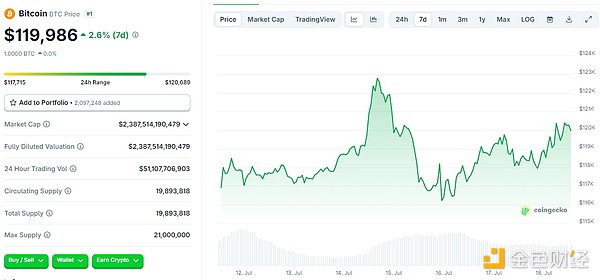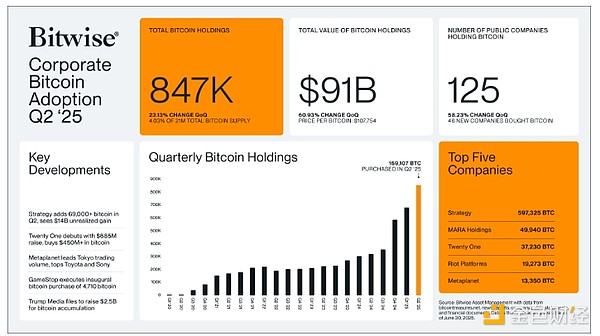Deng Tong, Golden Finance
On Thursday, local time, the U.S. House of Representatives passed three cryptocurrency-related legislations, the CLARITY Act, the GENIUS Act, and the Anti-CBDC Surveillance State Act. The CLARITY Act and the Anti-CBDC Surveillance State Act will be sent to the Senate for deliberation.
The GENIUS Act is expected to be signed into law by Trump on Friday local time. The bill will take effect 18 months after Trump signs it, or 120 days after the so-called "major federal payment stablecoin regulators," including the Treasury Department and the Federal Reserve, issue final regulations to implement the GENIUS Act.
With the implementation of good news on U.S. regulatory policies, the crypto market has ushered in a general rise. BTC once again broke through $120,000, and as of press time, it was $119,986, up 2.6% on the 7th.

Affected by many favorable factors, ETH has risen sharply in recent days and soared this morning, breaking through US$3,600. As of press time, it was reported at US$3,586.23, a daily increase of 7.5%.
For details, please refer to the Golden Finance article: "ETH returns to $3,000: Six major reasons boost the alt season. Is it coming?"

The entire crypto market is in a good trend, with XRP, DOGE, and ADA even recording double-digit gains.

The implementation of US regulatory policies will undoubtedly provide a reassurance for the future development prospects of the crypto market. As the GENIUS Act is about to be signed into law by US President Trump, what impact will the bill have on regulators, the banking industry, stablecoin issuers, the retail industry, payment systems, Wall Street financial giants, listed companies, etc.? How do industry insiders view the passage of the bill? Will it bring about altcoin season?
1. Review of the contents of the GENIUS Act
Seven key points of the GENIUS Act:
The Act prohibits any non-"approved payment stablecoin issuer" from issuing payment stablecoins in the United States.
The Act defines "payment stablecoins" as digital assets that maintain a fixed value through legal tender or other security reserve support.
The Act imposes federal standards on institutions approved to issue payment stablecoins, including full backing reserve requirements, reserve segregation, monthly certification, and capital and liquidity requirements, as well as a prohibition on re-hypothecation.
The Act allows state-regulated payment stablecoin issuers to issue stablecoins, provided that the applicable regulatory system is substantially similar to the federal system.
The bill gives federal banking agencies enforcement authority over approved payment stablecoins, similar to the authority that Section 8 of the Federal Deposit Insurance Act has over insured depository institutions and their holding companies and institutional affiliates.
The bill imposes customer protection standards on persons who provide custody services for approved payment stablecoins, including supervision and regulation, fund segregation, commingling prohibition standards, and monthly audit reports of legal reserves.
The bill prohibits federal banking agencies, the NCUA, and the SEC from requiring that custody assets be treated as liabilities. The bill also amends federal securities laws to make clear that payment stablecoins are not securities.
The GENIUS Act represents a landmark federal government effort to regulate the U.S. payment stablecoin industry by establishing clear licensing and regulatory requirements. The bill balances federal and state regulatory powers, ensures transparency through audits and reporting, and establishes clear enforcement mechanisms.
If payment stablecoins are recognized in the U.S. regulatory framework, this could open the door for companies to issue their own tokens. During the debate on the GENIUS Act, Apple, Google, social media platform X and Airbnb were reportedly looking into the matter, and two U.S. senators questioned whether Meta would have the same plans if the bill was passed.
The passage of the bill has positive significance in providing regulatory clarity, building a bridge between traditional payments and blockchain, and benefiting the crypto market. Previously, Golden Finance had an article discussing the content and significance of the GENIUS Act, which will not be repeated here.
For details, please refer to the Golden Finance article: "GENIUS Act Passed by the US Senate What are the Impacts on the Crypto Industry"
2. The impact of the GENIUS Act on various fields
1. US regulators: dual legal framework
The GENIUS Act allows multiple types of regulated entities (such as banks, credit unions, and non-bank institutions) to issue stablecoins and establishes a federal and state dual legal framework to regulate them.
These entities will be regulated by the National Credit Union Administration, the Federal Deposit Insurance Corporation, the Office of the Comptroller of the Currency, the Treasury Department, or the Federal Reserve, depending on their type.
It is worth noting that if the stablecoins issued by entities do not exceed US$10 billion, they can choose to be regulated at the state level, but the state does not have to establish a stablecoin regulatory agency.
2. Banks: Will be forced to move towards infrastructure such as smart contracts
The GENIUS Act puts more pressure on banks and fintech companies to provide faster and more programmable payment services. The bill will make regulated stablecoins possible and fundamentally promote real-time settlement, 24-hour fund flows, and programmable financial interactions. This way of transferring funds does not rely on traditional channels such as ACH, wire transfers, or even FedNow.
If end users and businesses gradually get used to real-time, programmable payments, banks must also keep up with this trend. This adjustment will be tricky for banks, as many banks need to invest in infrastructure that supports tokenized payments, smart contracts, and on-chain compliance.
3. Stablecoin issuers:
1) Apply for a national trust bank license
Logan Payne, an attorney at Winston & Strawn, pointed out that the GENIUS Act incentivizes stablecoin issuers to seek a banking license. The new stablecoin license under the Act limits the company's activities to "pure stablecoin issuance", but most stablecoin issuers do more than that.
"Currently, almost all stablecoin issuers issued in the United States under U.S. law are engaged in activities outside the scope of the license." Therefore, even if the issuer obtains a license approved by the GENIUS Act, they still need a state-level remittance license to operate nationwide. This will incentivize stablecoin issuers to apply for a national trust bank license from the Office of the Comptroller of the Currency (OCC).
2) Unapproved issuers will be prohibited
Three years after the bill is signed, any stablecoin issued by an unapproved issuer will be prohibited from being issued in the United States.
It is also illegal to offer foreign-issued stablecoins in the United States unless the issuer of the stablecoin is able and willing to comply with the legal requirements of the Act.
The Act provides a series of exemptions for foreign stablecoin issuers, including if the Treasury Department determines that their country of origin has a similar regulatory regime.
3) Public Monthly Reserve Reports
Institutions approved to issue stablecoins must back their tokens 1:1 with reserves of U.S. dollars or other monetary products (such as Treasury bills).
Issuers must publicly disclose the composition of these reserves and "have them reviewed by a registered accounting firm" while submitting a certification of the accuracy of the report to federal or state regulators.
4. Payment System: Facing Competition
Federal Reserve Governor Waller said stablecoins bring competition to the payment system, but does not believe they pose a threat.
Deloitte researchers believe that stablecoins have the potential to take away business from traditional financial institutions and bring advantages to emerging fintech companies with experience in digital asset trading. Roy Ben-Hur, head of digital asset financial services at Deloitte, said: Once stablecoins occupy a more important position in the payment field, stablecoin issuers such as Circle Internet Group in New York will have an advantage over traditional financial institutions.
5. Retail: Giants explore issuing or using stablecoins
According to people familiar with the matter, retail giants such as Walmart and Amazon are exploring whether to issue their own stablecoins in the United States. Because stablecoins allow merchants to bypass traditional payment methods-traditional payment methods bring them billions of dollars in fees each year, including transaction fees paid by customers when they use bank cards to shop. And stablecoins can speed up the payment process, which may be particularly attractive to merchants whose suppliers are located overseas.
6. Wall Street giants: exploring the issuance of stablecoins
Currently, many Wall Street giants, including Citi, JPMorgan Chase, Bank of America, Wells Fargo, etc., are exploring whether to jointly issue stablecoins. The move by traditional Wall Street giants to jointly issue stablecoins marks that mainstream finance and crypto finance are gradually getting closer.
7. Public companies: Continue the path of crypto treasury
According to Bitwise data, 46 public companies added Bitcoin to their balance sheets in the second quarter, bringing the total number of public companies holding Bitcoin to 125. These companies hold a total of 847,000 Bitcoins, worth approximately $91 billion.

Second quarter corporate Bitcoin adoption data. Source: Bitwise/X
Crypto digital asset investment products recently recorded the second highest single-week inflow of $3.7 billion. This brings the total assets under management (AUM) of crypto products to a record high of $211 billion, of which Bitcoin-backed products account for as much as $179.5 billion, or 85%. For details, please see the Golden Finance article: "From Gambling Operator to "ETH Version of MicroStrategy" Understand SharpLink's Path to Ethereum Treasury"
III. Praise and Doubts from Industry Insiders
Praise
Rep. Bryan Steil, Chairman of the Subcommittee on Digital Assets, Fintech, and Artificial Intelligence: PraiseThe GENIUS Act is an important milestone in U.S. crypto policy. "It encourages innovation and development of Web3 businesses in the United States. It establishes clear rules to ensure that consumers are protected and that businesses have clear supervision to participate in the digital asset ecosystem in a responsible manner."
Summer Mersinger, former member of the Commodity Futures Trading Commission and current CEO of the Blockchain Association: The vote on the Anti-CBDC Surveillance State Act demonstrates support for "privacy, market competition, and personal financial freedom."
USDC issuer Circle: The House of Representatives voted to approve the GENIUS Act for submission to the President for signature, which is critical to the future of the currency and Internet financial system. This shows strong bipartisan support for responsible innovation and makes it clear that the United States will play a leading role in the regulation of dollar-backed payment stablecoins. Circle commends congressional leaders for building a regulatory foundation that prioritizes consumer protection, financial integrity, and American competitiveness.
Daniel Liu, CEO of Republic Technologies: “We expect two major shifts in the post-GENIUS era. First, treasurers seeking cryptocurrency-denominated returns will increasingly turn to native ETH staking and transparent re-hypothecation vaults. Second, yield-generating tokens will evolve into well-defined, auditable assets—distinct from stablecoins and unfettered by traditional regulatory assumptions. Both trends are likely to increase Ethereum’s transaction activity and fee generation, thereby enhancing ETH’s long-term value and strengthening the case for institutional funds to hold ETH.”
Tim Lowe, Strategic Advisor at Bitwise Onchain Solutions: The Stablecoin Act could give Ethereum a bigger boost than other networks because more than half of the stablecoin supply remains in its ecosystem.
Question
California Congresswoman Maxine Waters: "The Republican encryption bill we are about to consider will create huge loopholes in our federal financial laws, putting consumers and investors at risk in the name of innovation. These bills will increase the possibility of another costly financial crisis, just like in 2008, when trillions of dollars in wealth were evaporated in the name of innovation."
Democrat Sean Casten: "Central bank officials warned last week that stablecoins threaten global financial stability and require stricter systems than traditional finance." "GENIUS The bill ignores all of these experts and instead ties stablecoins into our financial system without the safeguards required by banks and investment firms."
Fourth, will there be altcoin season?
"The resilience of the cryptocurrency market reflects the growing confidence of institutional investors. Major companies are rapidly hoarding ETH as part of their reserve strategies, while BTC maintains a stable dominance. SharpLink's bet on ETH highlights the structural shift in cryptocurrencies as a macro asset class."
Risk appetite has risen after the passage of the GENIUS Act, which is widely seen as a catalyst for favorable cryptocurrency legislation. Bitcoin hit a record high and is currently stabilizing around $120,000, and ETH's strong momentum has led to the rise of other altcoins-in periods of rising market confidence, altcoins tend to rise in tandem with ETH.
BTSE COO Jeff Mei said: "Altcoin season looks likely, especially if the Fed cuts rates."
As the ETH/BTC ratio rebounds, ETH's dominance - long overshadowed by BTC's macro narrative - begins to reassert itself. Given ETH's $64 billion 24-hour trading volume and rising inflows into ETH-related ETFs, traders are likely preparing for a third quarter uptrend led by Ethereum.
 Huang Bo
Huang Bo








